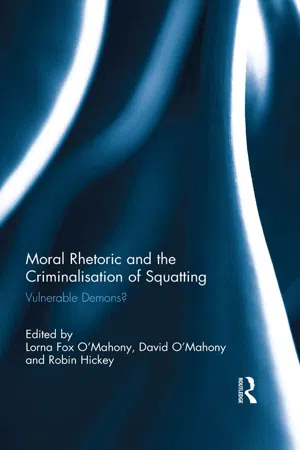
Moral Rhetoric and the Criminalisation of Squatting
Vulnerable Demons?
- 248 pages
- English
- ePUB (mobile friendly)
- Available on iOS & Android
Moral Rhetoric and the Criminalisation of Squatting
Vulnerable Demons?
About this book
This collection of critical essays considers the criminalisation of squatting from a range of different theoretical, policy and practice perspectives. While the practice of squatting has long been criminalised in some jurisdictions, the last few years have witnessed the emergence of a newly constituted political concern with unlawful occupation of land. With initiatives to address the 'threat' of squatting sweeping across Europe, the offence of squatting in a residential building was created in England in 2012. This development, which has attracted a large measure of media attention, has been widely regarded as a controversial policy departure, with many commentators, Parliamentarians, and professional organisations arguing that its support is premised on misunderstandings of the current law and a precarious evidence-base concerning the nature and prevalence of 'squatting'.
Moral Rhetoric and the Criminalisation of Squatting explores the significance of measures to criminalise squatting for squatters, owners and communities. The book also interrogates wider themes that draw on political philosophy, social policy, criminal justice and the nature of ownership, to consider how the assimilation of squatting to a contemporary punitive turn is shaping the political, social, legal and moral landscapes of property, housing and crime.
Frequently asked questions
- Essential is ideal for learners and professionals who enjoy exploring a wide range of subjects. Access the Essential Library with 800,000+ trusted titles and best-sellers across business, personal growth, and the humanities. Includes unlimited reading time and Standard Read Aloud voice.
- Complete: Perfect for advanced learners and researchers needing full, unrestricted access. Unlock 1.4M+ books across hundreds of subjects, including academic and specialized titles. The Complete Plan also includes advanced features like Premium Read Aloud and Research Assistant.
Please note we cannot support devices running on iOS 13 and Android 7 or earlier. Learn more about using the app.
Information
Part 1 The state Critical perspectives on criminalisation in the neoliberal state
1 The political economy of trespass Revisiting Marxist analysis of the law's response to squatting
Table of contents
- Cover Page
- Half Title Page
- Title Page
- Copyright Page
- Contents
- Acknowledgements
- List of contributors
- Table of cases
- Table of European legislation
- Introduction: criminalising squatting – setting an agenda
- PART I The state: critical perspectives on criminalisation in the neoliberal state
- PART II The squatter: vulnerability, lifestyle, protest and political rhetoric
- PART III The landowner: protecting property and adverse possession
- Conclusions: developing critical perspectives on the criminalisation of squatting
- Index